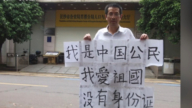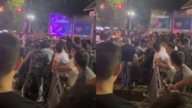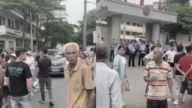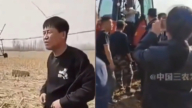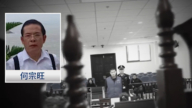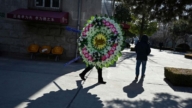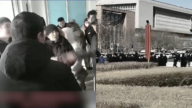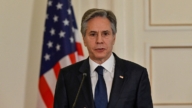【新唐人2013年12月21日訊】連日來,大陸各地區的檢察院和法院加快步伐,準備在未來幾週內,對多名異議人士進行起訴或者審判。據了解,在中國,每年的聖誕節和新年期間,火速審訊異議人士,已成為慣例。這其中,中共到底包藏了甚麼心機?一起來聽聽外界的看法。
《美聯社》12月18號的報導指出,多名大陸維權律師證實,中國各地區的檢察院和法院,最近加快了處理案件的速度,準備在未來幾週內,起訴或者審判多名異議人士。
報導說,有些案子已經等了幾個月,卻在過去幾天忽然加快程序,移交到法庭。一些維權律師表示,有關當局可能是希望趁節假日,在西方外交官、人權組織工作人員、和外國駐華記者休假期間,加快對異議人士的審訊。
今年7月被捕的中國法律學者許志永一案,就是其中之一。
作為民間組織「公盟」的創始人之一,許志永是中國「新公民運動」的標誌性人物。12月上旬,美國國務卿克里曾對許志永一案表示關注。而中共當局在12月13號正式起訴許志永,罪名是所謂的「擾亂公共秩序」。這項罪名也被認為是當局針對維權人士,所提出的最常見的罪名。
另外,安徽異議人士張林,於今年(2013年)8月被當局以「涉嫌聚眾擾亂公共場所秩序罪」逮捕。12月18號,張林一案開庭。代理律師劉曉原在賓館受到騷擾,一些前去聲援張林的網友也受到警方阻撓。
大陸維權律師江天勇:「中國那些司法部門,它沒有把心思放在如何去根據法律來審查,來看是否有利做出法律的判斷。而是把更多心思放在挑選一個甚麼日子,如何降低這個案件在公眾以及在外國的影響,尤其是降低媒體的影響。」
目前被軟禁在北京寓所的維權人士胡佳,18號晚間對《自由亞洲電臺》表示,在中國,每年的聖誕節、或新年期間,火速審訊異議人士已經是慣例。比如維權律師高智晟一案,在2006年12月22號開庭;而他自己,則在2007年12月27號被捕。都在聖誕節和新年附近。
胡佳感慨,這只能說明中共外交和政法維穩機關的齷齪,和他們刻意迴避西方社會壓力的一種詭詐。而大陸維權律師 江天勇則表示,對於那些異議人士,中共恰恰是想選擇能讓他們的家人、朋友感到痛苦的日期,來審判他們。
江天勇:「 我覺得這種選擇開庭和宣判日期,不僅反映當局沒有從法律上考慮,而且它這種選擇和基本人性、人道是背道而馳的。 因為無論是在中國還是西方,這些節日都是家人團聚的日期。」
今年8月初就被關押的廣州舉牌運動先驅、異議人士郭飛雄,被控涉嫌「聚眾擾亂公共場所秩序」一案,日前在沒有通知律師的情況下,已被秘密移送檢察院審查起訴。
陝西異議人士趙常青,也在這個月被移送審查起訴。
此外,12月16號,廣州異議人士劉遠東收到了法院的正式起訴書,他是在今年2月被當局抓捕。起訴書在原有罪名上又增加了「聚眾擾亂公共場所秩序罪」。
胡佳說,街頭運動在廣州頗有影響,有關當局忽然增加劉遠東的罪名,很可能是想試圖藉此整治各地的街頭運動。
中國東南大學法學院教授張讚寧:「對異議人士進行審判,說明在中國大陸還是很害怕不同的聲音,還是在壓制民主,還是在實行黨禁、報禁,凡是有不同的聲音它都認為是『顛覆罪』,和『打算顛覆罪』,所以這個政府是個很虛弱的政府,是個不願意接受群眾批評監督的政府,就是一個獨裁政府。」
在今年7月許志永被拘捕後,9月13號,另一位「新公民運動」的發起人之一王功權、也被警方逮捕。
採訪/陳漢 編輯/王子琦 後製/李勇
CCP authorities secretly speed up prosecution of activists
Local procuratorates and courts in Mainland China
are speeding up the cases or trials of several activists
within the following weeks.
Accelerating the trials of activists is said to have become
a routine practice in Mainland China during
the period of Christmas and New Year holidays.
But what exactly is the secret the Chinese regime is hiding?
An Associated Press report on Dec. 18 said several mainland
Chinese human rights lawyers confirmed that local
procuratorates and courts are speeding up the case processing,
and preparing to prosecute or sentence some activists
within a couple of weeks.
According to the report, some cases which had been halted
for several months are suddenly being quickly processed,
and then transferred to the courts.
Some human rights lawyers say local authorities hope to
expedite sentences on activists while western diplomats,
staff of human rights organizations and foreign media reporters
in China are all on their holidays.
Chinese law scholar Xu Zhiyong’s case is
one of these expedited cases.
Xu was arrested in July of this year.
As one a co-founder of the NGO Open Constitution Initiative,
Xu Zhiyong is an iconic figure of
China’s New Citizens Movement.
In early December, the American Secretary of State
John Kerry expressed his concerns over Xu’s case.
On Dec. 13, Xu was officially charged with
the crime of so called “disrupting public order".
This crime is regarded as the most common one
designed for activists.
Anhui activist Zhang Lin was arrested
by the local authorities in August.
He was then charged with the crime of being a
“suspect in gathering a crowd to disrupt public order".
When Zhang’s court case opened session on Dec.18,
his lawyer Liu Xiaoyuan was harassed in the hotel he stayed
at and some visiting netizens who support Zhang
were also blocked by the police.
Jiang Tianyong, China-based human rights lawyer:
“Chinese judicial departments are not interested in
processing cases by law and looking into
whether the judgment is in favor of law.
On the contrary, they are more interested in deliberately
selecting particular dates to minimize the influence
of the case on the public, foreign countries,
and especially the media."
Human rights activist Hu Jia is now
under house arrest in Beijing.
He told Radio Free Asia on Dec.18th that it’s become the routine
every year in China to have activists quickly sentenced
during Christmas and the New Year.
For example, human rights lawyer Gao Zhisheng’s case
was opened with court sessions on Dec. 22, 2006.
Hu Jia himself was arrested on Dec. 27, 2007.
Both of these two cases took place in the time
around Christmas and the New Year.
Hu Jia says this only shows the filthiness of the CCP’s
diplomacy and it’s political stability maintenance laws,
and the craftiness of the CCP intentionally
evading western society’s attention.
China-based lawyer Jiang Tianyong says the CCP precisely
wants to sentence those activists on the particular chosen date
which can make their family members and friends suffer most.
Jiang Tiangyong:"I think selecting dates like this to open court
on and sentence activists shows that local authorities not only
have no consideration for these cases from the angle of law,
but they also violate basic human nature and humanity.
Because whether it is China or western countries,
these holidays are times for family to reunite."
Activist Guo Feixiong was detained in early August of 2013
for displaying sensitive political slogans
in a public area of Guangzhou City.
He was charged with being a suspect in
“gathering a crowd to disrupt public order".
A couple of days ago he was secretly transferred to a local
procuratorate for prosecution without his lawyer’s knowledge.
Shaanxi activist Zhao Changqing was also transferred to
a local procuratorate for prosecution this month.
On Dec. 16, Guangzhou activist Liu Yuandong received
the formal statement of charges from the court.
He was arrested in February of this year.
On the statement, his additional crime is
“gathering a crowd to disrupt public order".
Hu Jia says public activities by activists in Guangzhou City
has a significant impact. The local authorities’ suddenly
adding a new allegation on Liu Yuandong might well be
an attempt to curb such public activities across the country.
Zhang Zanning, law professor at China’s Southeast University:
“Sentencing activists shows that Mainland China’s authorities
fear different voices, and they still suppress Democracy
and carry out the party-ban and publishing-ban.
The CCP authorities declare all different voices as
‘committing the crime of overthrowing the existing regime’
and ‘the crime of preparing to overthrow the existing regime’.
Therefore this government is very weak
and is unwilling to accept the criticism and monitoring
from the people, and is an autocratic government."
After Xu Zhiyong was arrested in July of this year,
another co-founder of the “New Citizenship Movement"
Wang Gongquan was also arrested by the police on Sept. 13.
Interview/ChenHan Edit/Wang Ziqi Post-Production/LiYong


